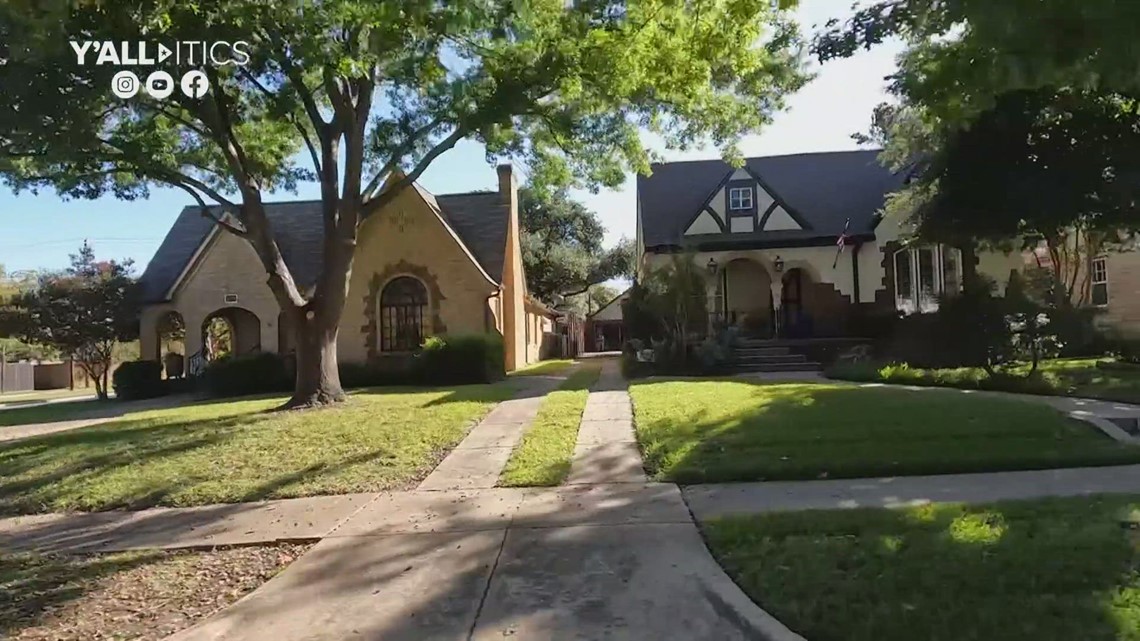Can 1,500 sq. ft. make Texas more affordable? A Dallas councilman makes his case


Chad West says Dallas is following in the footsteps of the West Coast, and even the East Coast to some extent.
DALLAS — When it comes to the housing affordability crisis in Texas in general, and the city of Dallas in particular, Council Member Chad West is blunt: it’s such a problem, the city could soon lose plenty of business and it has already lost plenty of people.
“If you think about it this way, your average family who makes $60, $70, $100,000 a year, they simply cannot afford to live in the city anymore,” West told us on Y’all-itics.
And what is anathema to Texans, West says Dallas is following in the footsteps of the West Coast, and even the East Coast to some extent, experiencing rapid population growth without a housing policy in place to keep up with it.
“If we don’t want to end up like Seattle or Portland or San Francisco, or priced out like New York City, we’ve got to do something different in the city of Dallas and we have to start being proactive about it now,” he said.
And the residents who suffer most, according to West, are those who typically are the middle class heartbeat of the city.
By 2030, the city is expected to be 88,000 housing units short for folks who make in the general range of $50,000 – $60,000 a year.
West says that is your teachers, your entry level police officers and firefighters, your mail carriers, hospital techs and service workers.
“So, where are they going to go?” West asks. “They’re going to have to, like, live outside the city or we may just not have those people available for us as a city to function.”
West says this didn’t happen overnight, that the problem has been growing steadily for decades now, and it’s one of the reasons you see such urban sprawl in North Texas.
One solution to ease the crisis could boil down to 1,500 square feet. The city of Dallas will soon begin discussing whether to lower minimum lot sizes – the amount of dirt residents can build on – in the city to that amount.
The average lot size in many areas of Dallas is around 5,000 sq. ft.. But you’ll find lot sizes up to 10,000 sq. ft. throughout the city as well.
And the zoning that created this issue has been around since the 50s and 60s.
West says think of the Normal Rockwell ideal where everyone had a big yard and white picket fence, and that was considered the American dream.
“You talk to your average millennial or these centennials (Gen Z), and a lot of them will tell you I’m cool with a loft, with an apartment or a back house. I don’t want to take care of a big yard. And our zoning hasn’t kept up with the changes that we’ve seen over the last 70 years in how people live, it just simply hasn’t,” West argues.
The concept of reducing minimum lot sizes isn’t new.
Houston lowered its minimum lot size to 1,400 square feet in some areas of the city. And Austin is considering a drop to 2,500 sq. ft..
The benefit is housing density. And more houses will lead to lower prices.
But reassessing lot sizes is only part of the equation in Dallas.
The city will also consider whether to allow duplexes, triplexes and fourplexes in single family neighborhoods. And “granny flats,” or accessory dwellings built in backyards, will also be discussed.
Without any action at all, the situation could get even more dire for Dallas.
As people consider moving out, businesses could refuse to move in.
West says a metals company that was considering relocating to Dallas decided to stay and expand their plant in Louisiana instead and it was because of the housing affordability crisis that would face its workers if it chose to move.
“It’s kind of just on the forefront of it now,” West says. “I think it could get worse. But we don’t want to wait until the roof has collapsed if it’s already leaking to fix it.”
The Dallas City Council will receive a briefing on these proposals on December 6, 2023. If a majority decides to move forward, then more formal proposals would be introduced and voted on within a year, West predicts.
Until then… welcome to Dallas. We hope you can afford it.




